Renault Nissan Automotive India Crosses 4.5 Million Powertrain Manufacturing Milestone
- By MT Bureau
- October 29, 2024
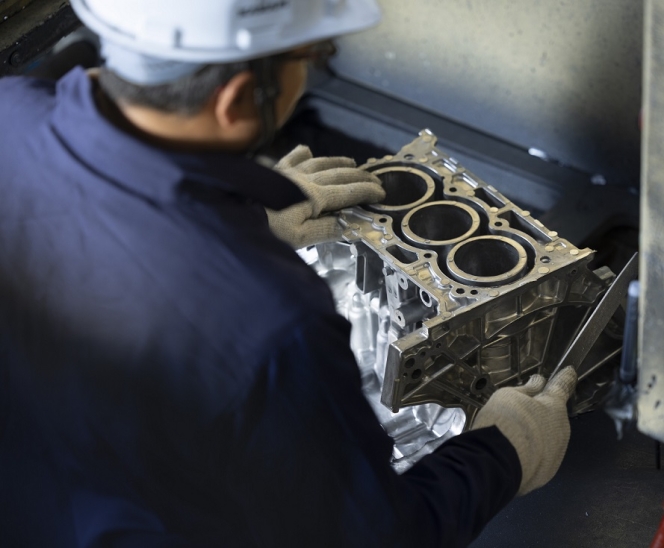
Renault Nissan Automotive India (RNAIPL), the unique dedicated manufacturing facility for the Renault Nissan Alliance, has manufactured over 4.5 million powertrain units at its facility in Oragadam, Chennai (India). This includes 2.83 million engines and 1.67 million gearboxes since the start of production in 2010.
The facility produces Renault and Nissan cars for India and export markets with over 2.75 million cars produced since start of operations in 2010. The state-of-the-art manufacturing facility also includes end-to-end capabilities for production of engines from melting of aluminium ingots, casting the molten metal into various engine parts such as the cylinder head and cylinder block at the casting shop, machining them to the perfect size and dimensions at the machining shop and assembling them together at the assembly shop. The plant has the capacity to produce engines with ranges from 800cc to 1500cc.
RNAIPL also houses all facilities required for manufacturing gearboxes including gear machining, shaft machining, clutch house machining and gear heat treatment.
Since start of production in May 2010, Renault Nissan Automotive India has produced seven different types of engines and three varieties of gearboxes. RNAIPL’s Powertrain reached the production milestone of one million engines in 2016, within six years of start of production and has also produced more than 160,000 units of EV reducer components for exports.
Keerthi Prakash, MD, Renault Nissan Automotive India, said, “The production of 4.5 million powertrain units is a very important milestone for RNAIPL. In addition to powering the cars produced at our Chennai plant, we have also exported powertrain units and components to other countries around the world. Looking to the future, as part of the USD 600 million investment announced by the Renault Nissan alliance, we are readying our infrastructure to produce the engines and gearboxes for our new models.”
One of the top variant engines that is currently produced by RNAIPL is the HR10 TURBO engine that features the unique mirror bore cylinder coating technology used in sports cars such as the Nissan GT-R. The technology reduces resistance inside the engine, cutting weight, improving heat management and combustion to deliver smooth acceleration and efficient fuel use.
RNAIPL’s plant uses robotic vision camera technology to ensure complete quality confirmation during the production of powertrain units and the sequential process flow ensures that each unit does not proceed to the next stage in manufacturing until it has been confirmed and certified for its quality.
Rockwell Automation Concludes 7th Edition Of India Inc On The Move Event
- By MT Bureau
- February 19, 2026
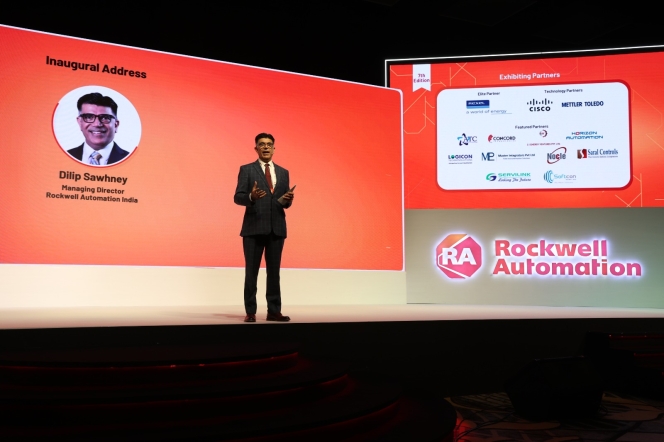
Rockwell Automation, Inc. has concluded the seventh edition of India Inc On The Move (IIOTM) in Mumbai. The event brought together industry leaders and technology innovators to discuss the impact of artificial intelligence (AI), digitalisation and sustainability on Indian manufacturing.
The conference, themed 'The Future Is Here: Smart. Sustainable. AI-Driven Manufacturing', addressed how technology can accelerate transitions in sectors including semiconductors, electronics, automotive, life sciences and food & beverage. These developments are intended to support the manufacturing sector’s role in the Viksit Bharat 2047 initiative.
IIOTM 2026 recorded over 1,200 attendees and included 30 sessions with 70 speakers. The event featured an expo floor with 30 booths displaying interactive technology solutions.
Key areas of discussion included:
- Autonomous Operations: Utilising AI to manage manufacturing processes.
- Software-Defined Manufacturing: Transitioning hardware control to software-based systems.
- Intelligent Sustainability: Implementing digitalisation to track and reduce environmental impact.
- Sector Focus: Strategies for semiconductors, life sciences and automotive industries.
Dilip Sawhney, Managing Director, Rockwell Automation India, said, “IIOTM stands as a catalyst for transformative thinking, bringing leaders together to envision how artificial intelligence can redefine modern manufacturing, unlock new possibilities at scale, and shape a resilient, sustainable industrial future for India.”
“India stands at a pivotal moment, where artificial intelligence, digitalisation and sustainability are converging to redefine industrial competitiveness. The next era of ‘smart’ manufacturing will be shaped by autonomous, software‑defined operations. For the industrial world, however, AI must rise to a higher purpose – being deterministic, explainable, and fully auditable,” added Sawhney.
Knorr-Bremse’s Begins Construction Of EUR 200 Million Chennai Future Campus
- By MT Bureau
- February 15, 2026
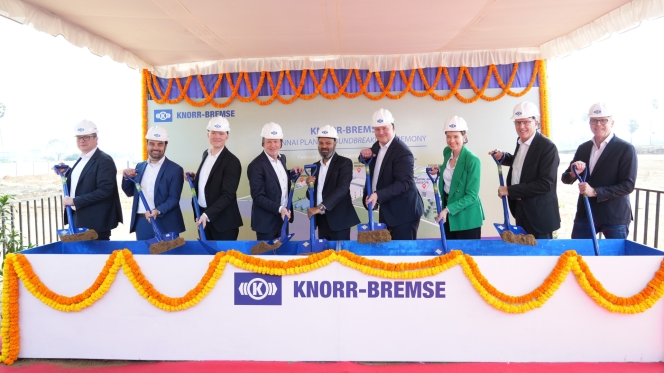
German component manufacturer Knorr-Bremse has initiated the construction of a modular campus in Chennai, India, with an investment plan of up to EUR 200 million over the next five years. The facility will integrate engineering, production and artificial intelligence (AI) activities.
Scheduled to commence operations in late 2027, the site will support both the Rail and Truck divisions. The campus is designed to accommodate up to 3,500 employees and will complement existing sites in Pune and Palwal.
The 188,000 square metre facility will be developed in phases. The initial stage includes production plants for metro and high-speed train entrance systems, alongside braking components for commercial vehicles. Later phases, extending to 2030, will add office complexes to house global business services, including finance and HR functions.
Products manufactured at the Chennai hub are intended for the Indian domestic market and global exports. Knorr-Bremse is currently a supplier for rail projects in Delhi and Chennai and is providing braking and sanitation systems for India’s high-speed rail network.
The company selected Chennai due to its infrastructure and engineering landscape. The new campus is located near the Knorr-Bremse AI centre established in 2025. This proximity is intended to accelerate digital projects and improve process efficiency.
Marc Llistosella, CEO, Knorr-Bremse, said, “India is a key region for us with great potential – as a location for innovation, a production hub, and a transport market. Our future campus enables us to connect global capabilities even more closely, make processes more efficient, and accelerate projects. This creates a strong foundation for our Rail and Truck divisions to grow profitably – in India as well as in international markets. The campus is an important building block in our global strategy and a clear commitment to Knorr-Bremse’s long-term growth path.”
- MIC Electronics Limited
- Letters of Acceptance (LoAs)
- Eastern Railway
- Howrah Division
- projects
- approximately
- INR 44.5 million.
MIC Electronics Secures Eastern Railway Orders
- By MT Bureau
- February 13, 2026
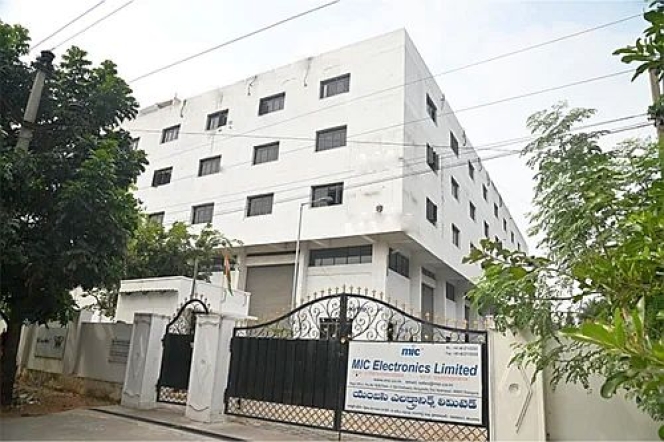
MIC Electronics Limited has secured Letters of Acceptance (LoAs) from Eastern Railway, Howrah Division, for projects valued at approximately INR 44.5 million.
The orders have been awarded under two separate competitive tenders and further strengthen the company’s position in India’s railway digital infrastructure ecosystem.
They involve design, supply, installation, testing, and commissioning of advanced Passenger Information and Communication Systems (PIS) across multiple railway stations in the Howrah Division. The scope of work includes the deployment of state-of-the-art railway information display systems and allied infrastructure, in line with Eastern Railway’s stringent technical, safety, and quality specifications. The projects are scheduled to be completed within six months from the date of issuance of the LoAs.
The development reinforces MIC Electronics’ strong execution capabilities in large-scale railway projects and its growing role in Indian Railways’ digital modernisation initiatives, said Rakshit Mathur, CEO, MIC Electronics Limited.
MIC Electronics specialises in the design, manufacture and implementation of Passenger Information Systems (PIS), railway display solutions, public address and communication systems, LED display and digital infrastructure solutions, and electronic and telecom infrastructure.
- Automotive Component Manufacturers Association
- ACMA
- Boston Consulting Group
- BCG
- Vinnie Mehta
- Vikrampati Singhania
- Vikram Janakiraman
ACMA And BCG Release Study On Smart Factory Adoption In India
- By MT Bureau
- February 11, 2026
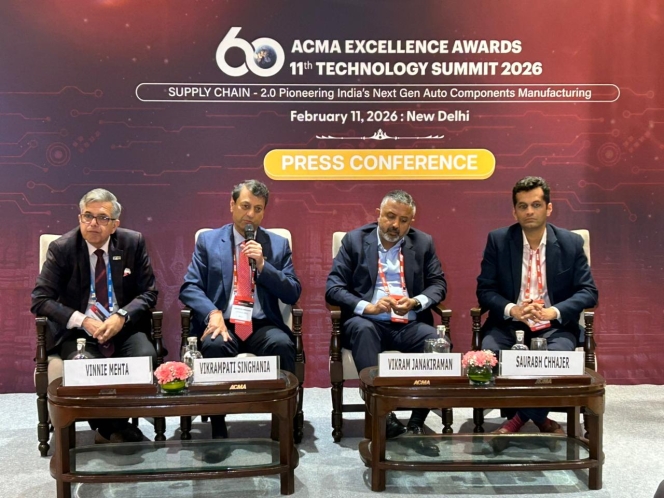
The Automotive Component Manufacturers Association of India (ACMA) and Boston Consulting Group (BCG) have released a joint study titled ‘Bolts, Bytes and Bots: Reimagining Next-Gen Auto Component Manufacturing in India’. The report examines the impact of digitalisation, automation and analytics on the sector.
The Indian auto component industry grew at a CAGR of 14 percent between FY2020 and FY2025, reaching a value of USD 80 billion. During this period, exports increased 1.5 times to approximately USD 23 billion. The sector is now targeting USD 100 billion in exports by FY2030.
The study indicates that over two-thirds of surveyed companies are in the pilot, scale-up, or fully integrated stages of implementing smart factory initiatives. Nearly 60 percent of these firms report benefits in productivity, quality, asset utilisation and issue resolution.
- Shift from basic connectivity to advanced analytics and AI-based maintenance.
- Use of digital twins and automated systems to manage volume and complexity.
- Focus on operations and quality as primary areas for digital intervention.
- Move towards interconnected digital stacks rather than isolated solutions.
Digital readiness is becoming a requirement for global OEM sourcing. International partners increasingly expect high standards in traceability, audit readiness and quality control. The report finds that companies with scaled deployments are twice as likely to experience a significant business impact compared to those in the pilot phase.
Vikrampati Singhania, President, ACMA, said, “The findings clearly indicate that Smart Factory initiatives are moving from experimentation to execution across the sector. The next phase must focus on scaling these efforts across plants and the supplier ecosystem. This will require shared platforms, deeper partnerships and coordinated ecosystem development, where industry bodies like ACMA can play a catalytic role.”
Vinnie Mehta, Director General, ACMA, added, “What stands out is the structural shift in how digitalisation is being viewed no longer as a discretionary investment, but as a long-term lever for competitiveness. As the industry balances export growth, coexistence of multiple-powertrains and workforce challenges, smart manufacturing offers a practical pathway to improve reliability, productivity and quality using existing assets.”
Vikram Janakiraman, Managing Director and Senior Partner, BCG, noted, “India’s auto component sector has led the charge on localisation and import substitution over many years, building deep manufacturing capability and scale. Today, as growth accelerates across domestic and export markets, the challenge is managing both volume and complexity. It is promising to see that the sector has made a start by adopting Smart Factory initiatives, with Indian companies already realising significant OEE improvements, quality gains, and better throughput from existing assets.”






Comments (0)
ADD COMMENT